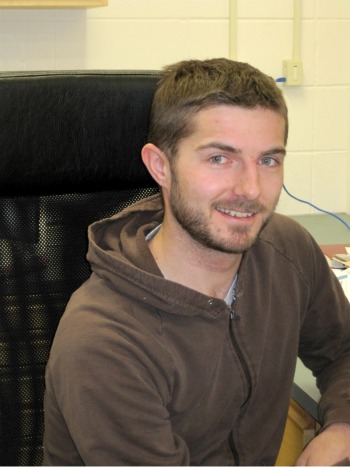
Award-winning doctoral student Nick Jendzjowsky looks at how exercise training affects the cardiovascular system.
To get to the heart of how exercise training intensity impacts the vascular system, doctoral student Nick Jendzjowsky first had to figure out how rats think.
"The main focus of my research is on how exercise training effects the regulation of peripheral blood vessels and blood pressure," says Jendzjowsky who won the Canadian Society of Exercise Physiology's PhD poster presentation award for his work, "Evaluation of a non-interval training progression designed to increase exercise tolerance at different velocities in rodents."
"To establish how exercise affects the cardiovascular system, we first had to establish our exercise training protocols," says Jendzjowsky of his work with Dr. Darren DeLorey. "We are particularly interested in how the intensity of exercise training may influence cardiovascular control. Therefore, we had to determine how we could exercise train rats at different intensities while making sure that all other components of the exercise prescription, for example; the total distance run, were matched between groups.
"A major focus of this project was to determine just how quickly the treadmill speed could be increased during the initial stage of training and how that might affect the overall design of a training program."
That meant having to find a way to train rats, which don't listen to commands and don't normally run on a treadmill.
What he's learned is that rats have plenty in common with humans. "They have different personalities, just like humans," he says. "Some really like to exercise and are natural runners, whereas others take a little while to figure it out."
Jendzjowsky trained the rats on a rat-sized treadmill, first introducing them to it and letting them get used to it.
"Like any five-year old, they wouldn't know what a treadmill is, they'd have time to explore it before using it," he says. After a week of getting used to the treadmill it's turned on at a very slow pace and the rats gradually get the hang of it, and the pace is gently accelerated.
"The study will help Nick to look at how different training protocols influence physiological adaptations," says DeLorey."He is particularly interested in how the sympathetic nervous system (a branch of the autonomic nervous system) helps regulate the cardiovascular system. Many disease states, and even aging, are associated with elevated sympathetic nervous activity. However, our understanding of how regular exercise training affects the neural control of the cardiovascular system is limited."
Jendzjowsky adds, "It is generally accepted that exercise is good for us, however our understanding of why exercise is good for us is quite poor, as is our understanding of the how we should exercise to improve health."
This study actually began as a small pilot project, explains DeLorey. "We were simply trying to establish the exercise regimen that Nick would use to address his thesis question. As we evaluated the findings, we recognized that information of this type was lacking in the scientific literature and we believed that the findings from this study could provide some practical guidelines for the design of exercise training studies. The award from CSEP is a nice honour for Nick and I believe recognizes the practical implications of the findings, but more so the great job that Nick did presenting his findings at the meeting."